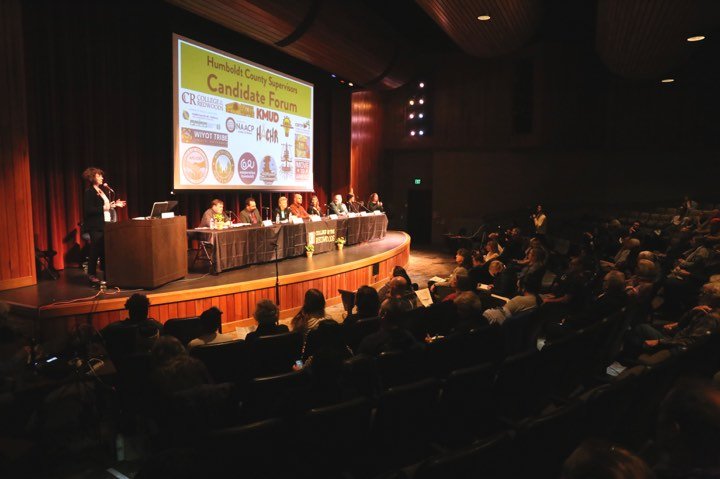
Candidates for the First and Second District seats on the Humboldt County Board of Supervisors gathered at the College of the Redwoods theater for a candidate forum. | Photos by Andrew Goff.
# # #
Seven candidates for Humboldt County Supervisor hit the stage at College of the Redwoods Wednesday evening to answer some weighty questions from a coalition of local progressive organizations.
The cast for this political production included incumbent supervisors Rex Bohn, who represents the First District, and Estelle Fennell, who reps the Second, plus the five challengers hoping to unseat them — Cliff Berkowitz (taking on Bohn), Sean DeVries, Michelle Bushnell, Michael McKaskel and Rick French (taking on Fennell).
All seven seemed eager to please as they answered questions about a wide range of socio-political issues, including climate change, immigrant rights, harm reduction programs, labor organizing and tribal government relations.
By far the most provocative question of the evening was a two-parter from Leslie Rodelander of the Eureka branch of the NAACP. (Representatives of each group that sponsored the event took turns asking questions, and candidates had just a minute apiece to answer.)
Rodelander recounted the inflammatory joke Bohn was overheard telling at a fundraiser last year — a crack about whether a Mexican dish was so authentic it might make people want to go out and steal hubcaps.
“Do you think this candidate’s statement was racist, yes or no?” Rodelander asked. The second part of her question: “What are you doing personally and what will you do as supervisor to address racism in Humboldt County?”
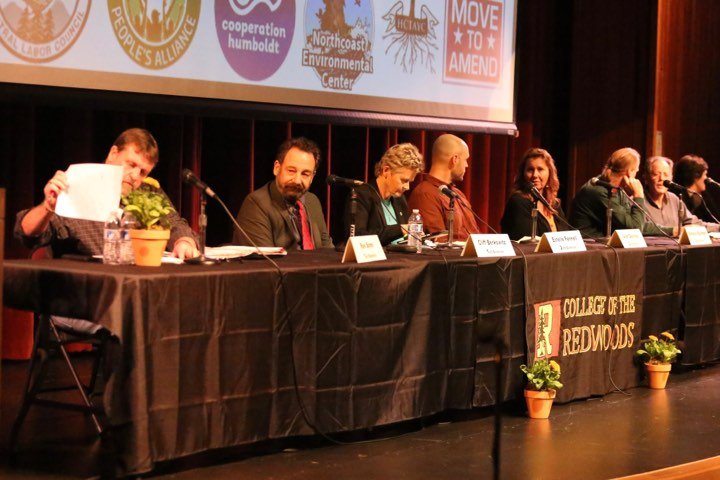
Humboldt County supervisor candidates (from left): Rex Bohn (incumbent), Cliff Berkowitz, Estelle Fennell (incumbent), Sean DeVries, Michelle Bushnell, Michael McKaskel and Rick French.
Fennell was called on to answer the question first, and she appeared uncomfortable. “When that particular statement made it to the press, a lot of people came to Humboldt County Board of Supervisors and expressed concern,” she said, referring to a heated meeting last April, where an organized protest reached such a fever pitch that Bohn prematurely adjourned the meeting and left the chambers. (A counter-demonstration in support of Bohn was held a few weeks later.)
Fennell didn’t say whether or not she considered Bohn’s joke racist but said, “[I]f people feel offended you have to pay attention to that and understand that that’s an important issue to address. I think that, um, racism is not in any way something that we can accept or support. Any time we think it’s there we need to address it in a good way.”
With that her time was up.
DeVries was less equivocal. “Yes, that was absolutely racist,” he said, adding that if he were supervisor he’d call racism out for what it is. “We need to stop the hate. We need to call it out,” he said.
Bushnell said that she wasn’t there when the comment was made, and whether or not it was racist, “it came off racist.” Educating and correcting people is important, she said.
McKaskel said yes, the joke was racist, “and black lives do matter.” People need to “be humans to each other,” he said, and he stressed the importance of having good employment policies.
French pulled no punches, saying, “Yes, it was a racist comment, and unfortunately I believe Rex is a racist.” He then launched into a non-sequitur about his longstanding property dispute with a neighbor, and he accused Bohn of refusing to let him speak at public meetings.
Finally (or second-from-finally, technically), it was Bohn’s turn to respond. After a brief preamble he said, “You’re right, it was racist … .” There was a pause before he continued, “… if it was said with malice intent.” He went on to offer some caveats: The joke was said to just one person but then got repeated. At the event in question he donated the two highest-value auction items, and he has been asked back this year. It was a “poorly repeated joke” from a Cheech & Chong record.
“My Hispanic friends know I don’t have a racist bone in my body, and if you want to use that as a political ploy, more power to ya,” Bohn finished.
Berkowitz said Bohn’s initial apology last April was “not an apology” because it was couched in the context, “if anybody was offended.”
“Humboldt County has a racist element that has been emboldened by our president,” Berkowitz continued. “People of color and the queer community do not feel safe.” He said the Board of Supervisors sets the tone for the county and has a responsibility to treat all people with respect.
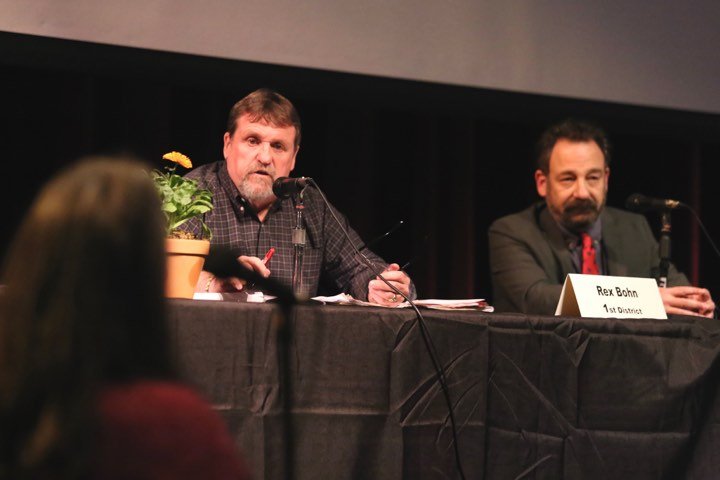
Bohn (left) and Berkowitz.
Most of the forum was less contentious, with candidates offering answers that differed in tone and emphasis more than substance.
On a question regarding whether Humboldt County should declare a climate crisis, for example, everyone said yes in one way or another, with varying degrees of conviction.
DeVries said he would “absolutely” issue such a declaration and seek state funds to buttress the county against the impacts of climate change. He also called for bringing “love back into the world” and “spirituality back to the masses.” Also: suing Big Oil.
Bushnell, on the other hand, appeared a bit flummoxed by the question. She said she would have to “refer back to special people to advise me” on the issue but would support the climate crisis declaration if she received the help and knowledge and answers she currently lacks.
McKaskel said the county shouldn’t be subsidizing the airline industry. French took the opportunity to say the county’s handling of the Terra-Gen wind energy project was poorly handled. Berkowitz and Fennell emphasized the importance of planning for sea-level rise.
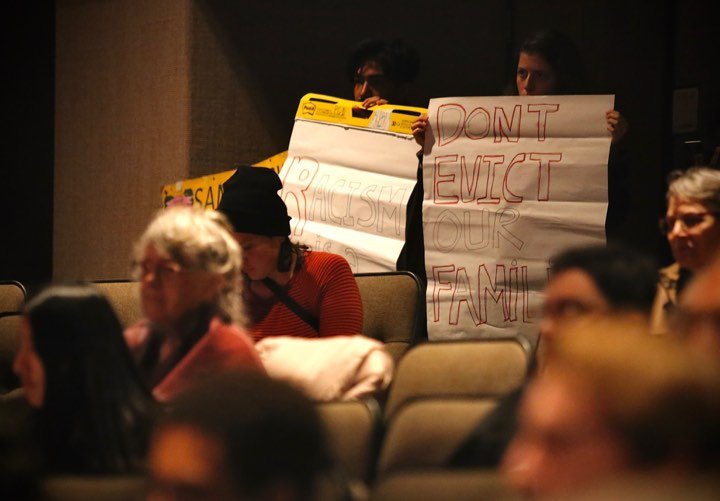
Protesters held up signs during a question from Centro del Pueblo.
Representatives of the community group Centro del Pueblo asked the candidates how they would serve the local bilingual community and protect immigrant rights, saying families in Fortuna have been racially targeted and harassed.
The candidates agreed that all people need to be treated with respect. Fennell noted that voters made Humboldt County a sanctuary county by passing Measure K in 2018, thereby preventing county employees, including sheriff’s deputies, from cooperating with ICE or reporting people suspected of being illegal immigrants.
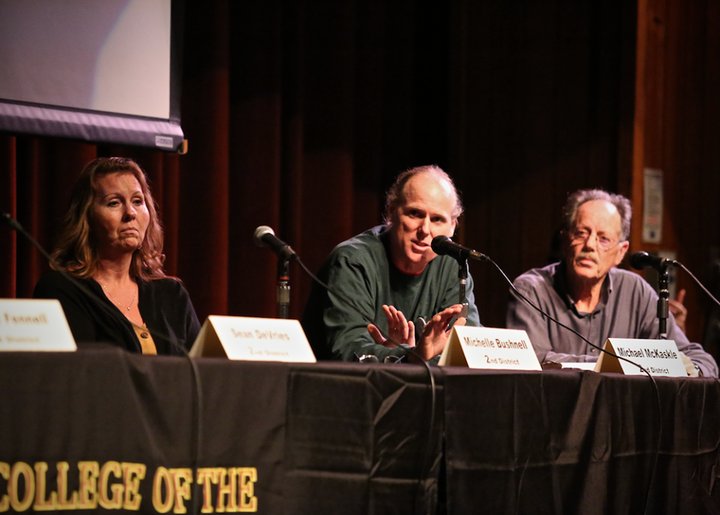
Bushnell, McKaskel and French.
Nezzie Wade, from the group Affordable Homeless Housing Alternatives (AHHA), asked the candidates for their short- and medium-term solutions to the county’s declared shelter crisis.
Bohn said he’s probably the only person sitting on stage who has created affordable housing, referencing his collaboration with Betty Chinn to create a container village, using modular trailers as transitional housing units. He said the county’s Department of Health and Human Services (DHHS) is in the process of buying two hotels to be used as more transitional housing, and units are being built to house veterans and the mentally ill.
Berkowitz went on the offensive, saying that in previous debates Bohn has talked about barriers to creating housing, “But as the Board of Supervisors, we set policy and regulations,” he said, speaking as if he’s already an elected member of that body. “We can remove those barriers and start building things faster and better.”
Fennell said the county has adopted a “bold new approach” in its latest housing element, an approach that includes tiny houses, safe parking areas and camping areas on state property. And she said she’s working with a group in Southern Humboldt to create a resource center with DHHS.
DeVries said financing and tax rebates can provide incentives. Bushnell said streamlining would be helpful, as would working with local communities to make sure they want any proposed housing. McKaskel thanked Wade for implementing AHHA’s “Shower Care-a-van” and said the county should get more involved in projects such as the City of Eureka-led conversion of the decrepit Downtowner into affordable senior housing. French said he supports parking lot camping but not tiny houses, which “don’t make any efficiency.”
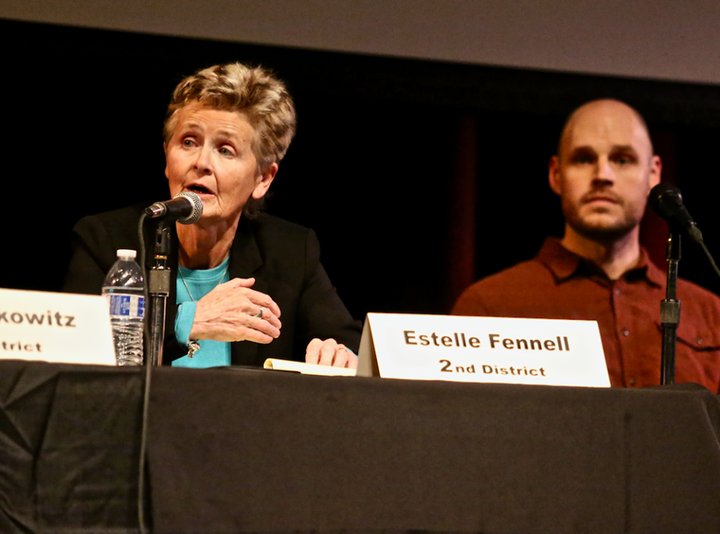
Fennell and DeVries.
Jessica Smith, the recently appointed executive director of the Humboldt Area Center for Harm Reduction (HACHR), asked each candidate to give their respective stance on harm reduction services such as increased access to medication assisted treatment, syringe exchange and overdose prevention sites.
Bushnell said that while she supports those services, she also believes that “if you create those situations where you’re just alleviating” addiction, you also need to provide education about how to get off drugs, “for the safety of the community.” (HACHR, it should be noted, does offer such information.)
McKaskel said harm reduction programs such as needle exchange are helping public health and cited Portugal as an example of successful harm reduction policy.
French said he supports HACHR, though he went on to make an odd reference to “the woman that led” the group previously and “fled or left with a lot of obscenities” — possibly a reference to HACHR founder Brandie Wilson’s exit interview here on the Outpost.
Bohn said needle exchange “with lots of supervision” works and said both HACHR and DHHS (which offers its own needle exchange program) do well treating the addicted. He also called for strict one-to-one exchange procedures and suggested each organization should hand out different-colored needles so the public can see who’s responsible for the most needle litter.
Berkowitz said, “Harm reduction is proven best practice, period.” It’s easy to blame an organization like HACHR, he said, but their staff is involved in cleanup, too, and the community’s problems with addiction point back to the importance of a housing first policy. If people are housed, he said, treating their addiction is much simpler.
Fennell, like Bushnell, emphasized the opportunity to “teach [addicts] the lessons of accountability and offer them services that can help them beat addiction.”
DeVries suggested mindfulness training and, noting it may be a bit radical, added that there have been advances in psychedelic therapy. “The science is real,” he said.
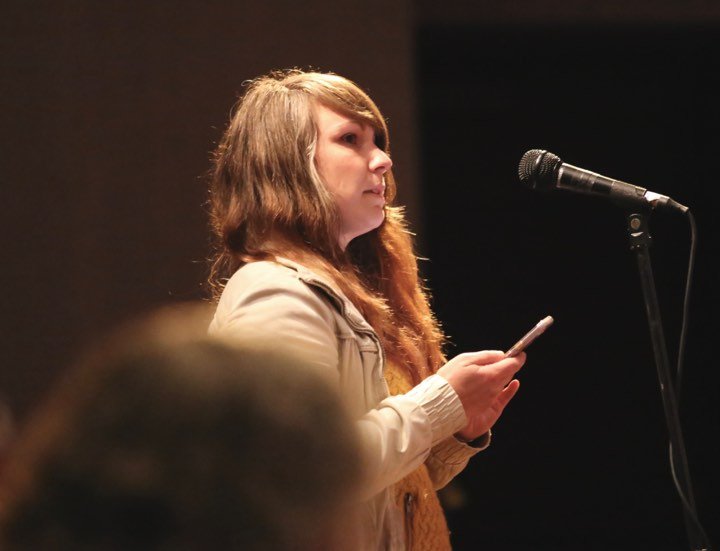
Jessica Smith of HACHR.
A representative of the Humboldt chapter of Health Care for All asked the candidates to say whether or not they favor a “Medicare for all” and explain what consequences their position would have for the county’s budget, employee benefits and access to health care for county residents.
McKaskel said a Medicare-for-all system would save Americans money by emphasizing preventive care, and he noted the county’s struggles with meeting its CalPERS liabilities.
French said the best he could do on this issue is support Bernie Sanders’ presidential candidacy. “I’m running for a nonpartisan office, but I’m not going to hide my support for Bernie Sanders,” he said.
Bohn noted he’s on Medicare and said his primary physician supports universal healthcare. He also said, “Tort reform: that’s what screws up the system” and noted that 68 percent of all personal bankruptcies are tied to medical bills.
Berkowitz “absolutely” supports Medicare for all and said the U.S. is “the only industrialized country on Earth where your income determines if you’ll die from a preventable disease.”
“I’m not running for president, so I don’t know how much I can influence” this issue, Fennell said, “but of course I believe in something along lines of Medicare for all, that kind of thing.”
DeVries recalled President Franklin D. Roosevelt’s attempts to get universal healthcare passed as part of his New Deal reforms and then challenged Bohn’s stance that lawsuits are the main culprit for high health care costs. Pharmaceutical companies make as much as 10,000 percent profit on prescription drugs, he said. “I think that’s a bigger problem than tort reform.”
Bushnell said she supports health care for everyone, “but if someone’s getting something for free, someone else is paying for it.”
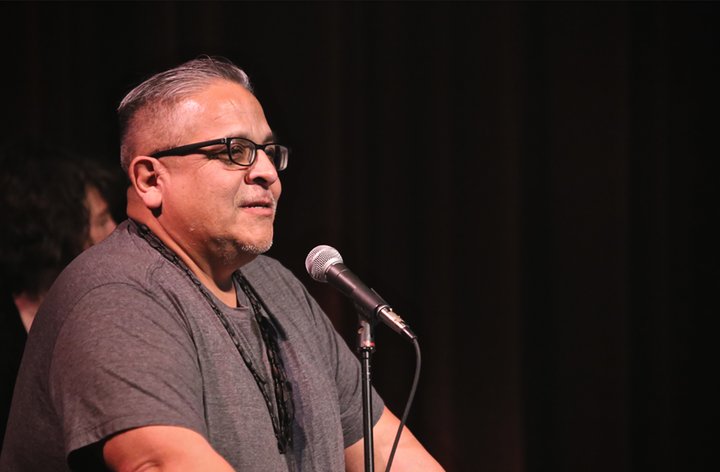
Ted Hernandez, chair of the Wiyot Tribe.
The last question of the evening came from Wiyot Tribal Chairman Ted Hernandez, who asked how each candidate would build the government-to-government relationship between the county and local tribes, and how they would protect natural resources and sacred tribal sites.
McKaskel started with an apology, saying his family came to Humboldt County in the 1850s. His great grandfather was district attorney during some of the region’s tribal massacres and “looked the other way,” McKaskel said, adding that while he gets cred for having deep local roots, there’s guilt tied in as well. He credited the tribes for their environmental stewardship and said he’s running to protect the environment.
French said he’d “like to take credit for pointing out another type of racism in the county.” He said he encountered people who look like him and can “relate to the feelings of the dispossessed [and] disrespected.” This reporter, for one, has no idea what he was talking about.
Berkowitz suggested that the county should hire a full-time tribal liaison to prevent the type of conflicts that arose during negotiations on the Terra-Gen project.
DeVries one-upped him, saying he was thinking the county should have two tribal liaisons. He seemed to be suggesting that these two positions would be added to the board of supervisors. (He noted that adding two would keep the numbers odd, preventing tie votes.)
# # #
That’s certainly not a comprehensive recounting of the forum. If you’d like to watch the whole thing, you’re in luck: Cooperation Humboldt posted video to its Facebook page. We’ve embedded it below. Election Day is March 3.
CLICK TO MANAGE